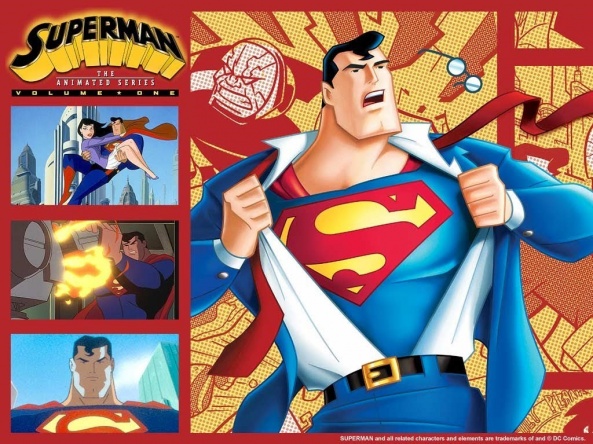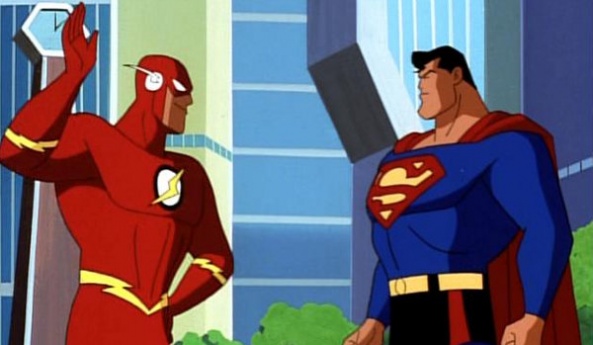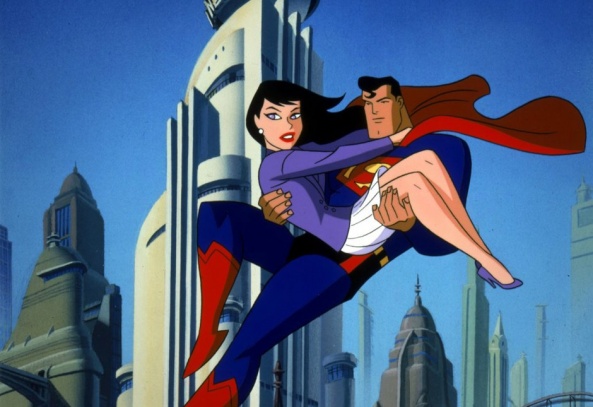Recently I spent the last month re-watching Superman: The Animated Series with my kids. It was a pleasant departure from our typical Disney themed watching habits and a welcomed return to an animated favorite from my youth. For many of us growing older with comics can become an interesting transition. Time becomes precious, and thus carving out a chunk to a series you’ve already seen can be foolish. I was pressed into the situation though when I sneaked in an episode of Superman: The Animated Series and my three-year old daughter said she liked it. It’d be frivolous of me. Heck, damn near negligent, if I didn’t pounce on this opportunity to fully introduce her to the wonderful world of the DC Animated Universe. Regardless if I had already seen it or not.

While my children are too young to fully appreciate the character’s importance to the American Comic Book landscape (she did call him Spider-Man upon first viewing), there is something so utterly unique and iconic to Superman that it can reach even a three-year old. And she definitely loved it. Absolutely loved it. To the point that it’d be the first thing she’d tell me in the morning. Which got me thinking. How can such a beloved character with a seemingly endless volume of backstories and issues be so strangely mismanaged by the film studio that owns him? Or even the fans that love him? As I contemplated the fundamental core concepts that the series brought to mind, I wondered what made Superman so heartfelt. How a character so unmistakably pure could create a divide among its fan base and the public at large.
Now, there’s an inherent flaw to the question of Superman being misunderstood. Specifically, it is rather presumptuous to think that I know what makes Superman a beloved character. That being said, I’d like to think that, much like myself, there is a sea of fans who pine for a time when Superman was taken at face value. When he didn’t have to be modernized. When he didn’t have to be brought into the “real” world. When he was simply the best possible man you could ever imagine inhabiting a fictional universe. A Superman.
I recognize that such an idealistic, Rockwellian view of the world is in short demand nowadays. But, humor me for a moment as we stroll down this nostalgic trail. This Silver-Age view of Superman, which I fondly cling to in “Superman for All Seasons,” comes across lovingly in the animated series. It is full of preposterous action, absurd luck where no one ever truly gets hurt, and a general disregard for the physics and logic that governs our world. And none of that matters.

Superman: The Animated Series represents what is probably the purest form that the character has seen in the past 25-years. Produced by Bruce Timm and featuring many of the same talented individuals which received accolades working on Batman, Superman was not a simple retread. The animation featured a purposeful departure in style. While Gotham is mired in an endlessly brooding Art Deco/Noir inspired ambiance, Superman and Metropolis bring a far cleaner retro-futuristic look to the screen. The music adds to the setting as well, featuring an uplifting, 1950’s era inspired score. And, while the episodes take some departures from the source material, you’d be hard pressed to find better stories with Superman as the title character. Given how affectionately crafted this rendition of Superman is, why has it been so difficult to transition this version of the character into other mediums?
I can’t recall when we, as a superhero comic buying society, went from understanding that these were characters in a fictional world which can be governed by fictional rules to a group of fans spouting that characters can’t possibly do this or that because of real-world physics. Logically, most of us would agree it doesn’t matter. These gripes do not have any real bearing on the quality of the story as long as the characters play by the rules established in that universe. Everyone should be fine with it. Yet, even as I type this I myself am guilty of such hypocrisy.
Continued belowWhile I didn’t notice the mass destruction in Man of Steel the first time around, I sure didn’t hesitate to tell people how in the real world the movie would have resulted in thousands of deaths. Why do focus on such things? Why can’t we enjoy them for what they are? As I sit down with my kids night after night and revel at the master storytelling that Paul Dini, Stan Berkowitz, Alan Burnett, and others brought to the small screen I place these silly rules aside and enjoy it for what it is. What makes Superman: The Animated Series, and the DCAU in general, immune to such critiques while Warner Brothers slowly implodes under the weight of their misguided choices?
An interesting aspect to the allure of Superman in the series is his approachability. Of particular effect is the downgrading of Superman’s power base. As a starting off point the Superman in the series is based on the 1986 reimagining by John Byrne. Gone are many of the more whimsical and silly aspects of Superman’s catalog, which had plagued the character for much of the 1970s. The series pushes this a step further as, while clearly a God among men, his capacity to inflict and take damage is tellingly reduced. This not only allows young viewers to more easily relate to the character, it also makes telling poignant stories far easier. It is well known that the cross of writing Superman has always been his invincibility. By making him simply very, very strong, you introduce the notion of real stakes.
Is that the secret to telling a compelling Superman story? Does stripping him back to the core of his character, and providing him just enough power to be relevant, but nowhere near God-like, bridge that gap? The gap between loving something for what it is, and bringing it into the real-world?

Why are we able to enjoy a stylistically simplified show such as Superman: The Animated Series and yet critique the comic and movies when things take a turn for the screwy? Is it because it’s a cartoon? Because I know that the target audience is a younger demographic. Or is it simply that the strength of the storytelling in Superman: The Animated Series transported me into a state of mind where such incessant nitpicking could be drowned out and overlooked. I truly don’t know. I wish I did because the enjoyment that the series has brought me this last month as I share it with my kids has been priceless.
While comics have evolved over the past 25-years, that is not what has left me longing for the more simplistic storylines. Call me naïve if you will, but it’s easy to forget that social reforms, political movements or even real world problems shouldn’t invade every single corner of our lives. Is there a place for them in the comic medium? Of course, and there is a long-standing tradition of seeing political movements touched upon from drug abuse to 911 reactions and gender politics. Sometimes though, we just need something true and pure to take us away from the reality surrounding us. Is there a place for more serious interpretations of Superman? Of course. “Superman: Red Son,” “Kingdom Come” and “What’s So Funny About Truth, Justice, & the American Way?” are amazing pieces of work and are rightfully cherished as prime examples of Superman’s iconic status. Yet, for many of us comic books are a form of escapism. A venue where our imagination coupled with a creative team’s vision help us avoid pain, relish in love, or simply give us a respite from the drudgery of the world.

With Warner Brothers at the precipice of another movie universe reboot, and DC falling back on multiple soft reboots to find their sales goal, the swirling storm of mediocrity that has surrounded Superman for the past 25-years has drowned out the gleaming examples of the character. The examples that when read, or viewed, instantly connect you to the character and the pure moral fiber than touches us all. Superman’s importance to our comic book society goes far beyond being the first categorical superhero, or one of the first characters to traverse multiple mediums. Superman is true and pure. Sentiments that remind us of our childhood comic book experiences. Sentiments that we yearned for from our parents and family. Sentiments that we hope… that we aspire, to have within ourselves.
Ultimately, that is how Superman speaks to me. Fortunately, Superman: The Animated Series has provided me and my family with a representation that is fairly close. I just wish that his other appearances throughout the past 25-years could have been so lovingly crafted. We can always hope that next time will be better.






